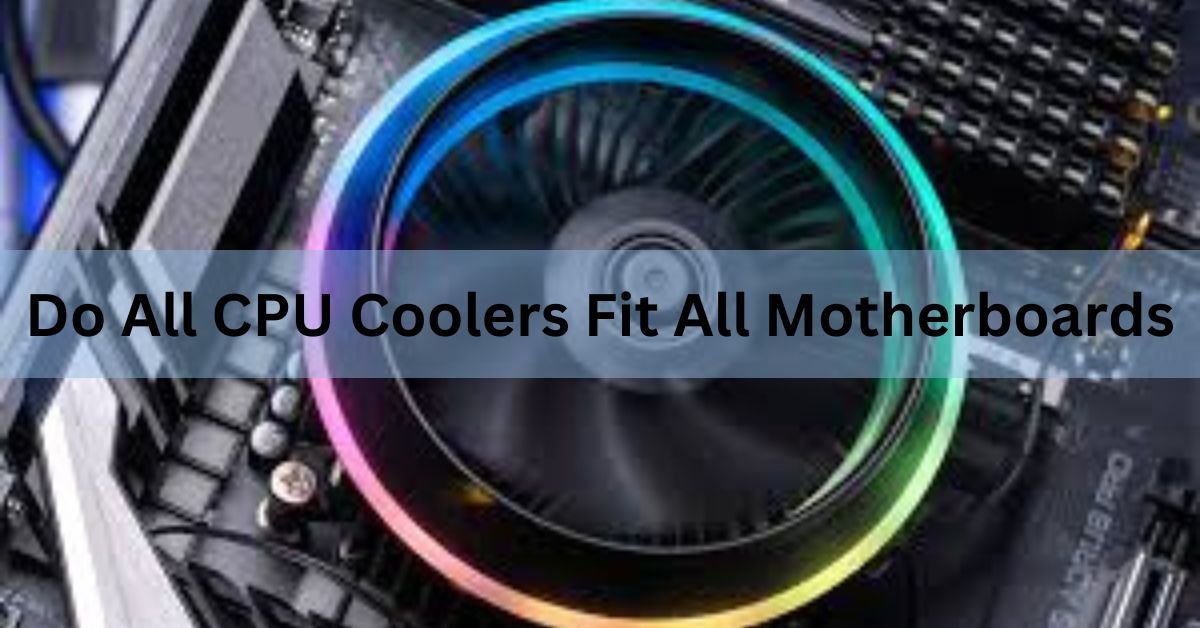The motherboard is often referred to as the heart of your computer, and for good reason. This critical component serves as the main circuit board that houses the CPU, RAM, and all other essential parts of a computer. Without it, none of the other components would be able to communicate or function properly.
Not all CPU coolers fit all motherboards. Compatibility depends on the cooler’s size and the motherboard’s socket type. Always check the specifications of both to ensure they match before buying.
In this article, we will discuss “Do All CPU Coolers Fit All Motherboards”.
Understanding CPU Coolers:
A CPU cooler keeps your computer’s processor from getting too hot. It usually has a fan and a heat sink. Some use liquid cooling for better performance.
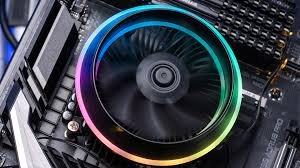
Choosing the right CPU cooler is important to keep your computer running smoothly, especially if you do heavy tasks like gaming or video editing.
Types of CPU Coolers:
1. Air Coolers:
Air coolers use a combination of heatsinks and fans to dissipate heat from the CPU. They are the most common type of cooler and come in various sizes and shapes.
2. Liquid Coolers:
Liquid coolers, also known as AIO (All-In-One) coolers, use liquid to transfer heat away from the CPU to a radiator, where fans then dissipate it. They offer efficient cooling but require more planning for installation.
Key Features of CPU Coolers:
- Heatsink Design: Determines how well the cooler can dissipate heat.
- Fan Size and Speed: Affects airflow and noise levels.
- Material: Copper and aluminum are commonly used for their heat conductivity.
Understanding Motherboards:
A motherboard is the main part of a computer. It connects all other parts like the CPU, RAM, and storage. Different motherboards have different features, sizes, and socket types. Choosing the right one is important for building or upgrading a computer.
Types of Motherboards:
ATX, Micro-ATX, Mini-ITX:
Motherboards come in different form factors, with ATX being the largest and Mini-ITX the smallest. The form factor affects the number of available slots and ports, as well as the physical space for components.
Key Features of Motherboards:
- Socket Type: The interface for the CPU, must match the cooler.
- RAM Slots: Position and number of slots can impact cooler installation.
- PCIe Slots: Placement can affect the room for larger coolers.
Compatibility Factors:
1. Socket Type Compatibility:
The CPU socket is one of the most critical factors in cooler compatibility. Both Intel and AMD have various socket types, such as LGA 1200 for Intel and AM4 for AMD, each requiring a specific mounting mechanism.
2. Physical Space and Dimensions:
Coolers come in all shapes and sizes, and the available space within your case and on your motherboard can limit your choices. Factors like the height of the cooler and the clearance from RAM and GPU slots are crucial.
Read: Motherboard SATA Port – Comprehensive Guide of 2024!
3. Mounting Mechanisms:
Different coolers have different mounting mechanisms, some of which are specific to certain socket types or manufacturers. Universal mounting kits can offer more flexibility but aren’t always perfect.
4. Power Supply Considerations:
Ensure your power supply can handle the additional load of your chosen cooler, especially if you’re opting for a high-performance liquid cooler which can demand more power.
How do I know if my CPU cooler is compatible with my motherboard?
To check if your CPU cooler is compatible with your motherboard, look at the socket type of both. They must match.
Also, make sure the cooler fits within the space in your PC case and does not block RAM or other components. Check the manufacturer’s specifications for details.
Are CPU coolers CPU specific?
No, CPU coolers are not CPU specific, but they must match the CPU socket type and fit within the PC case. Always check compatibility with both the CPU and motherboard.
Are all CPU coolers the same size?
No, all CPU coolers are not the same size. They come in different sizes to fit various PC cases and cooling needs. Always check the size for compatibility.
Are all CPU air coolers the same?
No, all CPU air coolers are not the same. They vary in size, design, cooling performance, and noise levels. Always check their specifications to ensure they fit your PC and meet your cooling needs.
Are Stock CPU Coolers Universal?
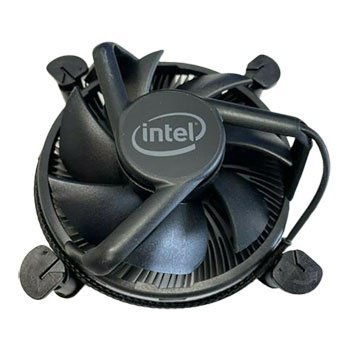
No, stock CPU coolers are not universal. They are designed specifically for the CPU model they come with. Always check if a stock cooler fits your CPU and motherboard before using it.
Are Aftermarket CPU Coolers Universal?
No, aftermarket CPU coolers are not universal. They vary in compatibility with different CPU sockets and sizes. Always check the cooler’s specifications to ensure it fits your CPU and motherboard.
How do I check if my CPU cooler is compatible with my CPU?
To check if your CPU cooler is compatible with your CPU, look at the socket type of your CPU and match it with the cooler’s supported socket types. Also, check the cooler’s TDP rating to ensure it can handle your CPU’s heat output.
How to Check if a CPU Cooler Is Compatible With My Motherboard:
To check if a CPU cooler is compatible with your motherboard, look at the socket type and mounting holes on the motherboard.
Make sure the cooler supports that socket type and fits within the space around the CPU area on your motherboard.
Are CPU Coolers Universal?
No, CPU coolers are not universal. They need to match the CPU socket type and fit within the PC case. Always check the cooler’s specifications for compatibility with your CPU and motherboard.
What are the signs that your CPU needs a cooler?
Signs that your CPU needs a cooler include overheating, sudden shutdowns or reboots, noisy fan operation, and performance drops during demanding tasks.
Monitor CPU temperatures using software tools and check if they exceed safe limits. If temperatures are high, consider upgrading or replacing the cooler.
Does all motherboards support all cooler?
No, not all motherboards support all coolers. Compatibility depends on the CPU socket type and cooler mounting mechanism. Check the motherboard’s specifications to ensure compatibility with your chosen cooler.
How do I know what CPU cooler will fit?\
To know what CPU cooler will fit, check your CPU’s socket type and compare it with the cooler’s supported sockets.
Measure the available space in your computer case to ensure the cooler’s dimensions fit. Additionally, consider the cooler’s height clearance to avoid interference with other components like RAM or graphics cards.
How To Tell What CPU Cooler I Have?
To identify your CPU cooler, check its brand and model name printed on the cooler itself. If you can’t find it there, look for a product sticker or label.
You can also search for your computer’s specifications online, which often include details about the installed cooler.
CPU Cooler Socket Types:
CPU cooler socket types vary depending on the CPU’s manufacturer (like Intel or AMD) and the specific model.
Common socket types include Intel’s LGA 1151, AMD’s AM4, and many others. Always check your CPU’s socket type before buying a cooler to ensure compatibility.
Am4 CPU Cooler:
An AM4 CPU cooler is designed to fit AMD Ryzen processors that use the AM4 socket. These coolers come in various sizes and styles, including air and liquid cooling options. When buying one, ensure it’s compatible with your specific Ryzen CPU model for effective cooling.
Am5 CPU Cooler:
An AM5 CPU cooler is designed for AMD processors that use the AM5 socket, which may be introduced in the future.
As of now, there might not be specific coolers available, but when AM5 CPUs are released, compatible coolers will likely follow, ensuring efficient cooling for those processors.
Motherboard, RAM, CPU cooler compatibility:
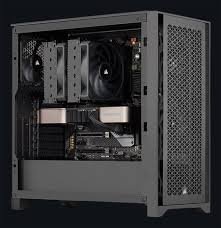
To ensure compatibility between motherboard, RAM, and CPU cooler, consider factors like socket type for CPU cooler and motherboard, RAM height clearance for cooler, and motherboard’s physical dimensions.
Consult manufacturer specifications or compatibility lists to ensure all components fit and work together properly in your system.
CPU Cooler Compatibility Checker:
A CPU cooler compatibility checker is a tool or software that helps users determine if a specific CPU cooler is compatible with their CPU and motherboard.
Users input their CPU and motherboard details, and the tool provides information on compatible coolers, ensuring a proper fit and functionality.
Do All CPU Coolers Fit All Motherboards Gaming?
No, not all CPU coolers fit all gaming motherboards. Compatibility depends on factors like CPU socket type, motherboard size, and clearance within the PC case. Always check compatibility before purchasing.
CPU Cooler Socket Compatibility:
This refers to whether a CPU cooler fits your computer’s motherboard. It’s important to check if the cooler’s socket matches your CPU socket.
Each motherboard has a specific socket type, like AM4 or LGA1151. Compatibility ensures the cooler can effectively cool your CPU.
Are all CPU coolers compatible with all motherboards?
No, not all CPU coolers are compatible with all motherboards. Compatibility depends on factors like CPU socket type, motherboard size, and cooler mounting mechanism. Always check compatibility before purchasing.
What factors determine CPU cooler compatibility with motherboards?
The main factors are the cooler’s socket type and the motherboard’s socket type. They need to match for the cooler to fit properly.
Additionally, consider the cooler’s size to ensure it fits in your computer case without obstructing other components. Checking compatibility ensures effective cooling for your CPU.
Read: Are Gigabyte Motherboards Good – Ultimate Guide – 2024
How can I ensure CPU cooler compatibility with my motherboard?
To ensure compatibility, check the CPU cooler’s socket type matches your motherboard’s socket type, like AM4 or LGA1151. Confirm the cooler’s size fits your computer case.
Refer to the motherboard’s specifications and the cooler’s documentation for guidance. Matching these ensures the cooler fits and effectively cools your CPU.
Do CPU coolers come in different sizes?
Yes, CPU coolers come in different sizes to fit various PC cases and cooling needs. Size variations ensure compatibility with different motherboards and cases. Always check dimensions before purchasing.
Can I use any CPU cooler with any motherboard form factor?
No, you cannot use any CPU cooler with any motherboard form factor. Compatibility depends on factors like CPU socket type, cooler size, and mounting mechanism. Always check compatibility before purchasing.
Are there specific CPU coolers for Intel and AMD CPUs?
Yes, there are specific CPU coolers for Intel and AMD CPUs. They are designed to fit the different socket types and mounting mechanisms used by Intel and AMD processors.
What should I consider when selecting a CPU cooler?
When selecting a CPU cooler, consider factors like compatibility with your CPU and motherboard, cooling performance needed for your usage, noise level, available space in your computer case, and your budget. Ensure the cooler can effectively dissipate heat while fitting within your system’s requirements.
How do I install a CPU cooler?
To install a CPU cooler, first, prepare your workspace and gather necessary tools. Then, apply thermal paste to the CPU, mount the cooler onto the CPU socket, secure it with screws or clips, and connect the fan’s power cable to the motherboard. Follow the cooler’s manual for specific instructions.
Can I use any CPU cooler for overclocking?
Yes, you can use any CPU cooler for overclocking, but some coolers are better suited for handling the increased heat generated by overclocked CPUs. It’s essential to choose a cooler with adequate cooling capacity.
Why is CPU cooler compatibility important?
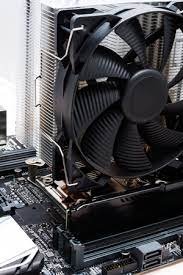
CPU cooler compatibility is crucial to ensure proper cooling of your CPU. Incompatible coolers may not fit or work effectively with your CPU and motherboard, leading to overheating, performance issues, and potentially damaging your hardware. Ensuring compatibility ensures efficient heat dissipation and system stability.
FAQs:
1. How can I know what type of CPU cooler will fit in my motherboard?
To know what type of CPU cooler will fit your motherboard, check the motherboard’s specifications for the supported CPU socket type and cooler mounting options.
2. Can any CPU fit into any motherboard?
No, not any CPU can fit into any motherboard. Compatibility depends on factors like the CPU socket type and the motherboard’s chipset. Always check compatibility before purchasing.
3. Can you use a motherboard 5 years or older with a newer CPU?
Yes, you can use a motherboard 5 years or older with a newer CPU if the motherboard supports the CPU’s socket type and has a compatible BIOS version.
4. Can an LGA 1150 CPU cooler fit on an LGA 1151 CPU socket?
No, an LGA 1150 CPU cooler cannot fit on an LGA 1151 CPU socket because they have different mounting hole patterns and socket layouts.
5. How can I know what CPU is compatible with my motherboard?
To know what CPU is compatible with your motherboard, check the motherboard’s specifications or manufacturer’s website for supported CPU socket types and compatible processors.
6. Are there any decent and cheap CPU coolers for a B560 DS3H AC motherboard and an i7 11700F?
Yes, there are decent and cheap CPU coolers available for a B560 DS3H AC motherboard and an i7 11700F. You can find options within your budget with adequate cooling performance.
7. How do I know if my motherboard will fit my PC case design?
To know if your motherboard will fit your PC case design, check the case’s specifications for supported motherboard form factors, such as ATX, micro-ATX, or mini-ITX, and compare with your motherboard’s size.
8. Can any type of RAM be used on any type of motherboard?
No, not any type of RAM can be used on any type of motherboard. Compatibility depends on factors like the motherboard’s supported RAM type, speed, and capacity.
9. Will a CPU cooler fit?
Yes, if it’s the right size for your CPU socket and fits in your computer case without blocking other components or interfering with airflow.
10. Can you use a CPU cooler twice?
Yes, you can reuse a CPU cooler if it’s in good condition and compatible with your new CPU. Just ensure proper cleaning and reapplication of thermal paste.
Conclusion:
In conclusion, CPU cooler compatibility with motherboards is essential for efficient cooling. Not all coolers fit all motherboards due to differences in socket types, sizes, and mounting mechanisms. It’s crucial to match the cooler’s specifications with those of the motherboard, considering factors like socket type, physical dimensions, and clearance. Checking compatibility ensures proper functionality and prevents overheating issues.
